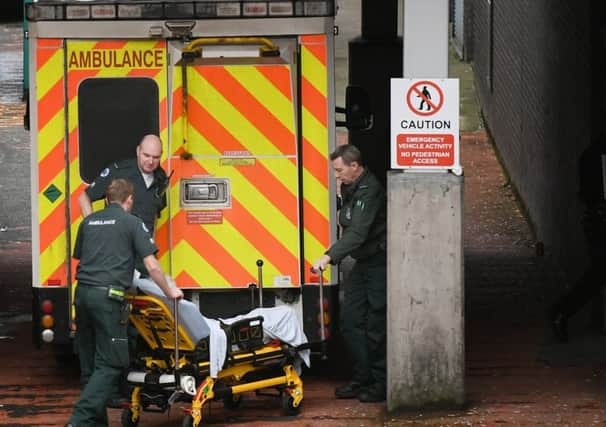Martyn McLaughlin: Under-resourced NHS excelled in treating my father


It had just gone 8pm on New Year’s Eve when my father was transferred from Inverclyde Royal Hospital’s accident and emergency department to the medical receiving unit, a crowded department five floors up. The signage refers to the unit as J North, but in local parlance, it is sometimes known as The Jungle.
Through the wire-mesh glass windows overlooking the moorland surrounding Coves reservoir, it was possible to see a few fireworks crackle and fizz over the nearby Fancy Farm housing estate. It was no spectacle, but on the busiest night of the year for the NHS, it was a momentary distraction at least.
Advertisement
Hide AdAdvertisement
Hide AdWhen we arrived in the four-bed ward, the communal television was tuned to a special edition of Antiques Roadshow, devoted to film and television memorabilia. For an audience reared on Scotch And Wry, Only An Excuse, and Thingummyjig, the schedule left much to be desired. “F****** Fiona Bruce, gies a break,” came a grunt from the corner, followed by a thick pearl of dark green phlegm, hawked up wheezily into a disposable pulp cardboard bedpan.
If it was intended as a reproval, its brevity could teach professional critics a thing or two. Yet no one changed the channel, partly because there was no remote control. The zappers, it transpired, are among the first things to be stolen in the wards, second only to the dispensers of alcohol-based hand rub – that’s one way to toast the bells.
No one would have chosen to welcome 2018 in such circumstances, but truth be told, my old man and I knew it was on the cards. He had struggled through his stay at ours during Christmas. A severe bronchial infection left him short of breath even when carrying out a task as trivial as putting on his new slippers. He was frustrated at his loss of mobility, but we did what all families do during testing times together: muster dutifully, intent on having a good time whether it be by force or fortune.
In hindsight, it was foolish to have been so nonchalant. When his condition worsened, we visited the A&E department of Hairmyres, where he was given a nebuliser and an extension to his course of steroids and antibiotics, before being discharged.
But the infection stubbornly refused to shift. Within a few days, he was reduced to gasping for air, and Inverclyde Royal beckoned. The treatment became more potent and frequent. He was kept in for the night and tentatively let out the next afternoon, weak and exhausted. The consultant was hopeful the amoxicillin would make a difference. His optimism was misplaced.
The next day, Hogmanay, was a blur, though not for the reasons you might expect. We spoke over the phone early afternoon. Or at least, I talked, and listened to my father choke and panic. I hung up and called the emergency services before alerting his neighbour, a marvellous wee man called Bob, a former weightlifter with a chest like a whisky cask and a heart to match.
A frantic drive later, I was met by a paramedic walking out my father’s front door, whistling as he went to the ambulance for a nebuliser T-piece. It was a sound so reassuring in its levity, I doubt I’ll ever forget it.
For the next eight days, my father remained in Inverclyde Royal, his condition steadily improving. It was one of the most chaotic periods for the NHS, and to bear witness to a slither of the work it carried out was humbling.
Advertisement
Hide AdAdvertisement
Hide AdI was there on New Year’s Day when nurses, struck down by the chest infection afflicting those under their care, turned up for work, only to be urged to return home by colleagues who realised they were too ill.
I overhead staff volunteering to work on indefinitely after wintry weather prevented their peers from further afield from making it in.
I watched as staff in A&E switched from treating a child with abdominal pains to a drunk with a head wound, who arrived swearing and spitting, flanked by police.
I listened to ambulance staff read out the football scores to a frail patient waiting to be taken home, clutching a discharge prescription in one hand, his coupon in the other.
I heard catering staff let slip the secret of the widely lauded hospital soup (“It starts out on the Monday as lentil, then you just fire in a different vegetable each day”).
The small acts of kindness were not always met with gratitude. I heard nurses being called cows, pricks, bitches, and much, much worse. Yet every time, their dedication never wavered. In patients’ hour of need, everyone was equal.
None of these moments are captured in the waiting-time spreadsheets which form a backdrop for the Punch and Judy show waged by Scotland’s political class, who in turn provide the ingredients for the right-wing press to dish out outrage-rich ladles of journalese slurry.
But the fact they are not recorded for posterity does not mean they go forgotten. Winter’s incessant rhythm will play out for weeks to come, and the system will continue to creak and falter. There were clear mistakes made in my father’s care, but could he have wished for a better guardian than our struggling health service? Such a thing does not exist.
Advertisement
Hide AdAdvertisement
Hide AdThat is not to say it could not. I am not blinded by my affection and admiration; the pressure staff are under is evident and unsustainable.
But amidst the sound and fury, the apologies and promises, the condemnation and recrimination, consider this something simpler: a thank you from one family, grateful for the NHS in all its imperfect glory.
